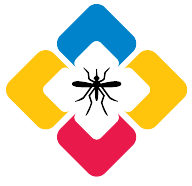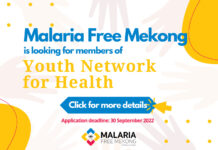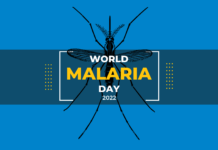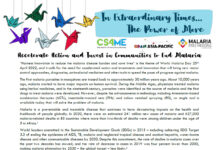Asia Pacific Leaders Malaria Alliance (APLMA) is organizing the Malaria week during 22nd – 25th April in Anantara Siam Hotel, Bangkok Thailand.
With the support of the APLMA and in partnership with APMEN, malaria CSO platform GMS had organized an interactive session on surveillance and community resilience on the afternoon of 23rd April at the Anantara Siam hotel, Bangkok, Thailand with the main objectives of the session were to 1) enhance understanding of malaria surveillance including 1-3-7 strategy implementation for malaria elimination and 2) provide a learning platform to malaria implementation on the sustainable malaria elimination approach in the GMS through building community resilience.
Prof. Gao Qi, from Jiangsu Institute of Parasitic Diseases, China presented Surveillance & response as a core intervention in malaria elimination, sharing Differences in control and 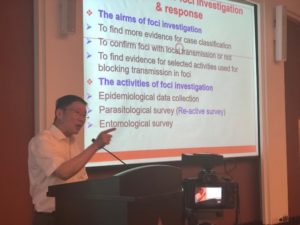 elimination phases and was sharing the successful of 1-3-7: China’s surveillance and response strategy. To transform surveillance&response as key intervention in elimination there is composed of 3 pillars;
elimination phases and was sharing the successful of 1-3-7: China’s surveillance and response strategy. To transform surveillance&response as key intervention in elimination there is composed of 3 pillars;
- Pillar 1 – Case diagnosis, treatment&reporting: with the key point are Universal access to diagnosis and treatment, and all of confirmed case reported on time,
- Pillar 2 – Case investigation & classification: the key point are quality control of laboratory diagnosis, and case investigation and classification, and
- Pillar 3 – Foci investigation & response: with the key point are the aims of foci investigation, and the activities of foci investigation as well as aims of foci response and the activities of foci response.
Dr Myo Thet Naing Win, Senior Program Coordinator for eHealth, Save the Children-Myanmar presented the malaria case based reporting (MCBR) mobile application. MCBR is an application that helps volunteers provide quality services and timely reports. With application features;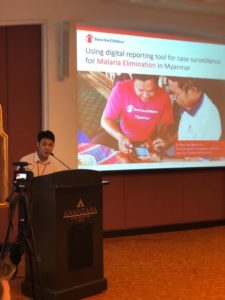
- Real-time reporting: Malaria testing and treatment case-level data is sent to a central database immediately when the volunteer is connected to a cellular network.
- Job aid: The application provides the volunteer with the correct treatment doses based on age, pregnancy status, presence/absence of severe symptoms, and plasmodium spp. as well as reminds volunteers what health messages to give.
- Supervision support: Analysis tabs in the application show summaries of the volunteer’s testing and treatment history and commodity consumption and balance. This helps volunteers supervisors provide appropriate feedback and commodities during monitoring visits.
- Village-level data: For each test, volunteer select the client’s village of residence from a drop-down menu of village in their area. This enables village-level data analysis.
- Customized dashboards: Supervisors, managers, and the National Malaria Control Program (NMCP) are able to quickly access the data that is relevant to them through web-based dashboards.
Dr Prayuth Sudathip from MoH-Thailand presented on the topic of Thailand Malaria Elimination: People centered Approach, and Community Resilience.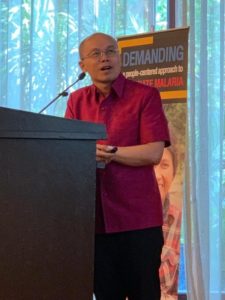
There are four main interventions under National Malaria Elimination strategy: 2017-2026, 1) Accelerate elimination of local transmission, 2) Develop technology, innovative strategy and model, 3) Foster collaborative network of stakeholders, and 4) Build capacity of community
For accelerating elimination, 1-3-7 strategy is started to apply in 2016. For the innovative measures and models, research studies will be continued to carry out and the updated findings from those will also be applied. Regarding the collaboration at national and international level, policies for implementation will be enforced, and investment and resource sharing will be enhanced. In addition to those, Behavior Change Communication and community participation will also be promoted, and all the activities will be well monitored and evaluated for the better outcomes.
While moving towards elimination, there are also some challenges faced.
- Limited financing, it is planned to do budget advocacy for increasing domestic fund through partnership with Civil Society Organizations, as well as engagement with local organizations. In order for the decentralization, there will be internal reorganization to streamline various activities as managed by the national program, plus local organization involvement.
- There are also issues concerning mobile migrant population and cross border movements. Malaria surveillance in undocumented migrants is still challenging. To solve those issues, the national program will work in a partnership with civil society organizations and will empower community involvement.
- It is also necessary to harmonize the action plan on malaria with the neighboring countries.
- To overcome the drug resistance problems, therapeutic efficacy studies are being integrated into routine surveillance system, together with ensuring & promoting adherence to artemisinin combination therapy.
Presentation :
